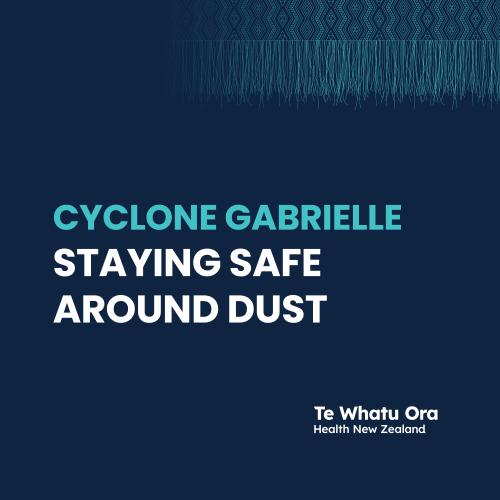
21 February 2023
Public health and hygiene information following Cyclone Gabrielle
Please attribute to Medical Officer of Health Dr Bridget Wilson
Cleaning up: Dust Advice
Flood waters have deposited large quantities of silt around Hawke’s Bay.
When the silt dries the surface layer can become airborne when disturbed by wind, vehicles or clean-up activities.
Airborne dust can affect people’s health and cause eye irritations, a cough, exacerbate asthma or lead to other respiratory problems. Silt may also contain other toxic substances.
If practical, remove silt deposits as quickly as possible and take the following precautions:
- If possible, stay indoors when dust levels are high.
- Avoid exercising in the dust.
- If possible, reduce vehicle numbers and speeds (10-15 km/hr) over silt-laden surfaces, to reduce dust generation and subsequent exposure.
- Wear suitable respiratory protection if exposure to dust cannot be avoided. Proper face-fit respirators (P2, N95) provide the best personal protection; however, even surgical masks will still offer some protection.
- Wear gloves, a long-sleeved shirt, long pants and gumboots or sturdy shoes when cleaning up.
- Anyone coming into contact with silt should wash and dry their hands and/or use hand sanitiser.
Foot and Skin Injuries
We have had a number of reports of foot and skin injuries from people standing on nails and/or debris when walking through flood water and sludge.
Because flood water and sludge contains nasty bugs, wounds can easily become infected which can lead to serious illness like tetanus.
When cleaning up in floodwater and sludge, remember to:
- Watch where you walk. Muddy floodwaters/sludge can contain sharp objects like nails and broken glass.
- Wear long sleeves, long pants and appropriate footwear if possible. Sturdy boots are recommended. Avoid going barefoot or wearing open-toed footwear to prevent injuries.
- If you are injured, treat cuts and puncture wounds immediately. To help prevent infections wash cuts and puncture wounds with clean water then apply a clean bandage. If your wound becomes infected or if you are not up to date with your tetanus vaccinations call your GP or Healthline on 0800 611 116.
Looking after yourself following a disaster
The flooding caused by Cyclone Gabrielle has greatly impacted our community and our staff.
It is understandable to feel sad, distressed, worried, confused, anxious and angry at the moment. It’s ok to not feel ok. These symptoms almost always pass with time. It can help to keep up usual routines, share your thoughts and feelings with whānau and exercise if you can.
Tackle the jobs that need to be done one bit at a time and count each small success.
It’s time to ask for help if your sleep is badly affected, you feel very distressed, irritable, on edge or agitated much of the time, or you feel hopeless and want to give up.
If you need to talk to someone, counselling is available for free by calling/texting 1737.
Mental Health and Addiction Clinicians as well as cultural support people are connecting with our civil defence centres and some community hubs for people who cannot access help via usual telephone lines.
ENDS
For more information contact:
Te Whatu Ora Hawke’s Bay Media Team
Mobile: 027-599-950






Post your comment
Comments
No one has commented on this page yet.